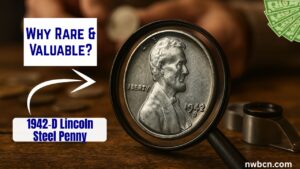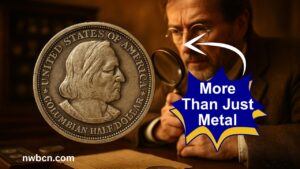Most 1943 pennies were made from zinc‑coated steel due to World War II copper rationing. But extraordinarily, a small number—15 to 30—were mistakenly struck on bronze planchets leftover from 1942, making them one of the rarest and most valuable modern U.S. coins.
Why These Coins Are So Valuable
- Ultra‑Low Survival: Only about 15–30 known specimens.
- Error Impact: Off‑metal errors of this type are rare because they reflect a direct mint mistake.
- Grade Sensitivity: High‑grade (MS‑65+) coins fetch spectacular prices. Even MS‑62 examples have sold for $1 million+.
- Historical Meaning: Struck during wartime, these pennies embody national and economic history.
Identifying a Genuine 1943 Copper Penny
- Magnet Test: Genuine copper is non‑magnetic; steel pennies are magnetic.
- Weight Check: Copper planchets weigh ≈3.11 g, steel planchets ≈2.70 g.
- Strike Detail: Genuine copper cents show sharp rims and crisp strike—steel dies used higher pressure.
- Professional Grading: Certification by PCGS or NGC is vital, especially to weed out copper‑coated counterfeits .
Data Snapshot: 1943 Copper Penny At A Glance
| Feature | Details |
|---|---|
| Year / Composition | 1943; off‑metal error on copper planchet (bronze) |
| Mint Marks Known | P (Philadelphia), D (Denver – 1), S (San Francisco – 1–4) |
| Estimated Number Known | 15–30 total examples |
| 2012 Sale | 1943‑S MS‑62 copper penny – $1,000,000 |
| 2010 Sale | 1943‑D copper penny – $1,700,000 |
| 2018 Sale | Philadelphia MS‑63 Red copper penny – > $1,000,000 |
| 2025 Auction | Recent million‑dollar sale reported |
| Magnet Test | Copper is non‑magnetic; steel is magnetic |
| Weight | Copper ~3.11 g; steel ~2.70 g |
| Condition Influence | Higher grades drive prices into seven figures |
| Counterfeit Risk | Many copper‑plated fakes; rely on grading/authentication |
Confirmed Examples & Recent Sales
- 1943-S Copper Penny (MS‑62): Sold in September 2012 for $1,000,000 to Texas Rangers co-chairman Bob R. Simpson.
- 1943-D Copper Penny (MS‑? Proof): Only one known, sold in 2010 for $1.7 million.
- Private MS‑63 Red (Philadelphia): Sold in January 2018 for over $1 million.
- Recent Million-Dollar Sale: A 2025 auction broke the $1 million mark again, underscoring rising interest .
How These Errors Happened
- Mint Planchet Mix‑up: During the transition to steel planchets in 1943, a few copper blanks remained in the hopper. One press strike could produce copper pennies with the 1943 date .
- Scarcity: Only Philadelphia (no mint mark), Denver (D), and San Francisco (S) copper errors exist. Only one Denver and 1–4 San Francisco examples are known; the rest are from Philadelphia.
What to Do If You Find One
- Perform Simple Tests: Try the magnet and weigh it precisely.
- Avoid DIY Tricks: Do not clean or alter the coin, as this can severely reduce value.
- Seek Authentication: Submit to PCGS or NGC.
- Auction or Private Sale: High‑value certified errors often go through auction houses or dealers specializing in high‑end numismatics.
If you discover a 1943 penny that’s not magnetic and weighs around 3.11 grams, you may be holding a multi‑million dollar coin. These pennies are not just rare; they represent a unique nexus of wartime scarcity, minting error, and historical mystique.
With only 15–30 examples known, every authenticated copper penny with the 1943 date is a numismatic powerhouse—capable of commanding prices well into the seven‑figure range. Handle with care, get it graded, and you might have the find of a lifetime.
FAQs
Q1: How many 1943 copper pennies actually exist?
Only about 15–30 examples are known across all mint marks, including singular Denver and a handful from San Francisco.
Q2: What’s the fastest way to test my coin’s authenticity?
Check with a magnet—copper will not stick, while steel definitely will. Then weigh it (target ~3.11 g) and get professional grading .
Q3: Could a 1943 copper penny realistically be worth over $1 million today?
Yes—several have sold for $1 million to $1.7 million, and recent private and public transactions confirm sustained, high-end valuations



